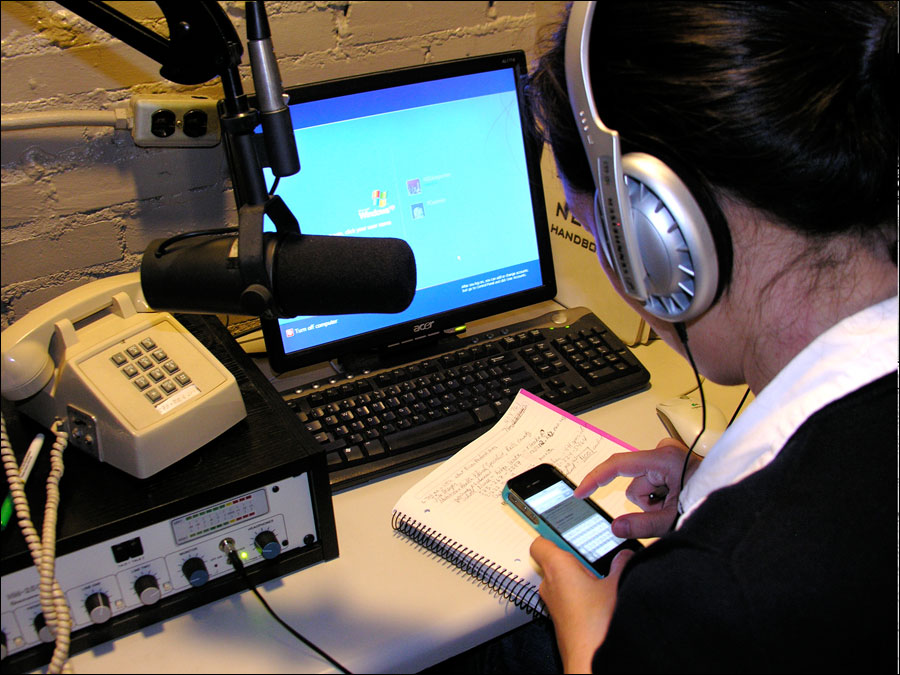Missouri Magazine Journalism Students Learn How to Write, Produce Radio Commentaries
Multimedia Skills Enhance Portfolios and Broaden Career Opportunities
By Gwen Girsdansky
Master’s Student
Columbia, Mo. (Feb. 6, 2014) — Learning how to write radio commentaries that keep listeners in their cars until the end – the so-called “driveway moment” – is part of the Advanced Writing capstone course for magazine students at the Missouri School of Journalism.
Associate professors Berkley Hudson and Mary Kay Blakely help last-semester seniors build their portfolios with work that is published or broadcast, so graduates have examples to show future employers.

The assignment to identify issues that listeners will care about and how to address them is good experience for the students, Blakely said. Most radio commentaries are essentially freelance pieces, topics that students identify and could pitch to news directors.
Magazine writers learn how to use their voices for punctuation, inflection for quotation marks and short subject-verb sentences. They also learn how to tell compelling, narrative stories with strong beginnings, middles and ends. And do they is a short amount of time and space. All of these are techniques important for radio presentations.
With the media world converging, magazine writers also often need to know how be interviewed for a podcast or record their story for broadcast, Hudson said.
“The ability of the students to transform their articles that are thousands of words long into a broadcast piece can be challenging in and of itself,” he said. “But, magazine students often use the written word, rather than vocals, to express themselves, which can provide extra hurdles.”
By the time the semester concludes, the students will have produced two- or three-minute radio commentaries through KBIA-FM, the NPR-affiliate housed at the University of Missouri. Some of the commentaries were aired on the station’s “Off the Clock” program, while the rest remain online only.
To prepare for such intense, and often intimate commentaries, Hudson said he begins the course by having the students develop, then read aloud, an intellectual autobiography. This helps them understand the importance of voice and point of view. The critique allows students to examine their mind and heart as well as enables the cohort to bond. Often, these autobiographies will lay the groundwork for the students’ commentaries.
Maeve McGoran, the commentary editor for NPR’s Morning Edition, is one of the writing coaches both Hudson and Blakely regularly tap for critiques.
“She’s great at identifying topics that work well for a national audience, expanding local news into national news, and turning a breaking story to an evergreen story,” Blakely said. KBIA-FM News Director Janet Saidi also helps brief the magazine students about how to choose subjects that can be aired. KBIA is mid-Missouri’s NPR-member station.
Saidi and Ryan Famuliner, BJ ‘07, the assistant news director, then help convert the students’ writing from that which reads well on paper to that which sounds good to the ear on the radio.
Dandan Zou, a graduate student whose commentary compared the education values of America with those of her home country of China, said that the class pushed her to appreciate the value of rewriting.
“I just wanted to finish a piece and be done with it,” she said. “On the contrary to what I thought would be a torturous experience, it was fun scrutinizing each sentence and sometimes certain words. It is a great feeling knowing that you are creating something of value and making it the best you can.”
Students wrangled their writing into radio commentaries that appeal to a wide range of listeners.
Edward Hart remembered his high school job as a lifeguard, and how difficult it could be to work in the service industry.
Miranda Metheny wrote an insightful commentary about why “luxury student housing” should be an oxymoron, and Elizabeth Collins wrote about a startling experience when an annoyed telemarketer hung up on her.
Stephen Johnson talks about how a phone scammer impersonated him and called his grandfather claiming to need bail money after being arrested in Mexico. The bogus request failed while helping to open a line of conversation between Johnson and his grandfather.
Updated: July 21, 2020